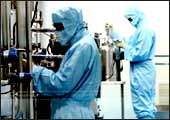 |
| Biocon's Mazumdar-Shaw: Challenging
Times |
It's
been a busy and tough year for Biocon's Chairperson, Kiran Mazumdar-Shaw.
First, the Karnataka government launched a probe against the Bangalore-based
biotech company for allegedly importing from China and marketing
in India a neurological drug, methylcobalamin, for the past seven
years without an import licence (Biocon says this issue was only
a procedural lapse and denies that it had to pay a fine when it
reapplied for and obtained a fresh licence). Then, while Biocon's
fourth quarter results were better than the previous quarter's,
analysts were still worried about the growing price pressure on
its bread-and-butter business of statins and a soaring R&D
budget.
Mazumdar-Shaw, 52, responded by hitting the
road. When this writer met her, the lady had just returned from
a hectic trip to Belgium and Switzerland, where between attending
conferences and symposiums, she squeezed in business meetings.
Barely 48 hours later, she was once again packing her bags for
trips to Israel and Jordan, not to mention the day trips she had
to make to Delhi and Mumbai on those two days.
Being the best-known face of biotech in India
means that Mazumdar-Shaw's time is not entirely her own. But the
bigger reason behind her frenetic schedules these days is the
fact that she's in the middle of navigating her 25-year-old company
through a crucial phase in its evolution. Born as an enzyme manufacturer,
Biocon today makes generic drugs-including statins, which are
cholesterol-lowering drugs-and nurses aspirations of being a drug
innovator. But managing the delicate balance between investing
for the future and satiating the investor's appetite for returns
at a company that listed a little over two years ago isn't proving
to be easy. Biocon's generic business has come under fire from
Chinese competitors, while investment in new facilities, besides
R&D, have added to profit pressures. For 2005-06, Biocon's
sales grew 11 per cent but net profits shrank 12 per cent. "The
year ahead will be a challenging one for us," admits Mazumdar-Shaw.
 |
| A Biocon lab: Work in progress |
A Battle Literally
Over the last two years, Biocon has invested
a massive Rs 450 crore in a production facility to boost its statins
business, especially Simvastatin and Pravastatin. The idea being
to get a toehold in the US generics market when the patents on
the two drugs expire in June this year. The addressable market
is estimated at $10 billion (Rs 45,000 crore). But Biocon won't
find the going easy. "This is a huge opportunity for Biocon,
but it's also a huge risk since there will be around 10 other
global vendors fighting for a share of the same pie," points
out a Mumbai-based analyst. More importantly, the company's new
biologics facility hasn't yet been certified by the US Food and
Drug Administration (USFDA), although an application for inspection
has been made.
Biocon already sells Pravastatin and Simvastatin
in Europe, and has significant market shares (20 and 40 per cent,
respectively) but it'll have to wait for the USFDA approval before
moving into the bigger and more lucrative market. But how does
Biocon plan to deal with Chinese competition, which has been responsible
for driving down prices by as much as 50 per cent in some statin
categories over the last 12 months, in the us? With a superior
processs technology. Apparently, the Chinese statin makers rely
on synthetic molecules, while Biocon will adopt a double fermentation
process. Why? Two reasons: One, Biocon believes it has superior
fermentation skills and, two, a double fermentation-based statin
will be much harder for a competitor to copy. (The biologic facility
not just beefs up Biocon's bio-manufacturing and bio-processing
skills, but also makes it the only large-scale producer of antibodies
and cell culture products in India.)
Statin production will, however, occupy just
one part of the spanking new Biocon Park. Another part has been
devoted to developing proprietary drugs based on monoclonal antibodies
(read: cancer vaccines). "We want to target areas where there
are no cures or where existing treatment options have nasty side-effects,"
says Arun Chandavarkar, Biocon's Chief Operating Officer, who
moved from manufacturing soon after marketing head Ajay Bharadwaj
quit recently. The first such MAB to treat head and neck cancer
may be launched by the end of the year, and work on drugs related
to arthritis, lupus (an autoimmune disease) and other types of
cancer is under way. "We are just beginning our foray into
a market that is expected to grow in the high double digits over
the next three-four years," says Chandavarkar but admits
that, "we are way behind some established names like Genetex."
The MABs that Biocon is working on are considered
second-generation chimeric or "humanised" MABs, compared
to the older murine (i.e. antibodies generated by injecting a
foreign substance or antigen into a mouse) variants of some of
Biocon's competitors. According to estimates, the global MAB market
could grow from $15 billion (Rs 67,500 crore) last year to around
$26 billion (Rs 117,000 crore) by 2010, with a dozen new variants
expected to hit the market. Pharma giants such as Roche and Johnson
& Johnson are just some of the companies operating in this
market, which already has 500 MABs under development by more than
200 companies worldwide.
"WE HAVEN'T LOST A SINGLE STATIN CUSTOMER"
Kiran Mazumdar-Shaw agrees that these
are difficult times for Biocon, but she also says that the
dip is temporary and that it will be business as usual soon
enough for India's largest biotech company. |
| After strong growth for a couple of years
recently, Biocon's performance seems to have visibly tapered
off. Why?
I think Biocon's performance is compared to large IT companies
in Bangalore and that's an unfair comparison. These businesses
are completely different, since biotechnology as an industry
requires much higher investments in R&D, has much longer
gestation cycles. People tend to get carried away by their
numbers and point out how slowly we are growing compared
to these high-fliers. We have just entered our next phase
of growth in the area of custom drug research and this requires
a new way of thinking for not just us, but the industry
as a whole. As a result of this I think Biocon's financials
may be more muted, but we are still a highly profitable
company.
However, you continue to face pressure on your bread-and-butter
statins business especially from Chinese vendors. How are
you countering these threats?
The Chinese vendors definitely made an impact on statin
prices in the global market, first by reducing prices marginally
by 10 per cent and eventually by as much as 40-50 per cent.
This has definitely hurt us and we had to reduce our prices
to compete with these vendors in the global market. Despite
reduced prices, Biocon remains a dominant player across
statin segments with over 50 per cent market share in each
one. Chinese vendors initiated the price reduction, but
we haven't lost a single customer to them across all our
markets.
Has the strong focus on statins affected your enzymes
business? Given the direction Biocon is now headed, how
critical is this segment?
A surge in our statins business meant that we had a capacity
constraint at our fermentation facility over the last few
quarters. This capacity constraint can be offset when the
new facility is inspected (based on customer demand) and
gets operational. Businesses such as enzymes and clinical
research outsourcing help us generate capital to invest
in newer businesses such as new drug discovery, so we remain
committed to growing them. There are also newer uses emerging
for enzymes in the areas of bio-fuels, for example, and
the interest in this area has been re-kindled, thanks to
the surge in oil prices.
There have been some delays in your new drug discovery
cycle. Why? Is it because of internal issues or due to external
factors such as regulations?
We are on track from our side, but the delay in this segment
is because of the slow pace of pharma regulations in India.
The most stringent regulators such as the USFDA takes a
month to approve a new drug, but the same procedure could
take up to eight months in India. We can't afford these
delays in our development cycle and for some products we
have even considered development overseas. This process
(in India) has improved dramatically since April this year,
but even then the time taken to get the green signal needs
to be halved.
|
Biocon's project of pride, however, is its
bid to develop an oral insulin-a breakthrough compared to the
existing dosage forms of insulin (either injectible or inhaler).
In India alone, there are an estimated 32 million diabetics, besides
which the US could prove a big market for a cheaper generic. According
to a report by equity research firm Motilal Oswal, "regulators
both in the US and Europe have indicated their willingness to
frame detailed guidelines for approving generic biotech products".
It is Mazumdar-Shaw's dream to turn the oral insulin into the
first blockbuster drug from India. If the clinical trials are
successful, it may actually hit the market in 2009.
End of March this year, Biocon acquired for
$5 million (Rs 22.5 crore) a bankrupt drug development company
in the us called Nobex, with which it had a deal for global co-development
and commercialisation of oral insulin and oral B-type natriuretic
peptide (BNP), a sub-part of a protein that helps reduce congestive
heart failure. Among the trial drugs that come with the deal are
an oral insulin for type 2 diabetes, another for inflammatory
bowel disease and yet another for cardiovascular disease. That
apart, Biocon gets full ownership of the oral insulin and oral
BNP programmes. "We propose to leverage these proprietary
assets through a combination of licensing and co-development partnerships,"
Mazumdar-Shaw had said at the time of acquisition. However, so
far, no such deal has been struck.
 |
| Biocon's Chandavarkar: In
search of new targets |
Worries Remain
Even as Biocon stays on its slow and searching
growth path, its stock price continues to be a source of worry
for some analysts. "The performance of the Biocon market
in a bullish market (the recent corrections notwithstanding) is
strange," says Darshan Mehta, CEO, Anagram Securities. "There
had been a huge interest in the counter for the first week after
it listed and then it faded away dramatically." For instance,
even as the Sensex topped 12,000 (before crashing and then recovering
some), Biocon stayed put in the Rs 400-500 band. When this magazine
went to press, it was quoting at the lower end of the range (Rs
405).
Mazumdar-Shaw, however, has been crying herself
hoarse trying to explain why Biocon cannot be compared to it companies,
which in some sense tend to set the stock market expectations.
"We are a profitable company and we will use money from initiatives
such as contract research and older businesses such as statins
and enzymes to support them," she says.
Maybe, but not to a large extent. Syngene,
Biocon's contract research arm, contributed Rs 100 crore to the
company's topline last year, but Clinigene, the clinical research
business, is relatively new and fetched just Rs 5 crore last year.
Syngene is expected to spend Rs 60 crore in its second phase of
expansion, while Clinigene has a Rs 5-6 crore budget for its new
facility being set up this year. "(Biocon's) long-term future
looks good, but it has several hurdles to negotiate in the next
couple of years," says Jayashree Mapari, Senior Research
Analyst, Frost & Sullivan.
The issues that face Biocon today aren't
unique to it. Indian pharma giants such as Ranbaxy Laboratories
and Dr Reddy's Labs are faced with the same problem of having
to invest in their future (read: innovation of drugs) even as
their mainstay generics business face stiff competition in the
us. But as these two companies have discovered, it doesn't pay
to cut back on R&D to beef up the next quarter numbers. And
Mazumdar-Shaw too knows that well.
|






